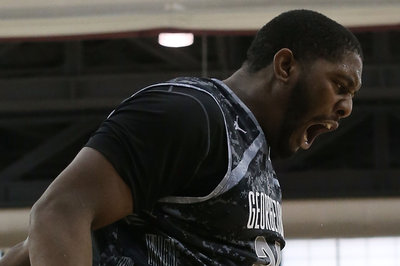NCAA Considering Change in Transfer Rules… Again
Posted by Chris Johnson on January 3rd, 2014One of the topics college basketball people frequently debate and nitpick is transfer culture. They get into other macro issues from time to time, like changes to how the game is officiated and amateurism, but transfer-related issues – a certain player’s waiver getting denied by the NCAA, for instance, or an inconsistent application of transfer rules, or the vast increase in transfers in recent years, or coaches deciding to block or limit where a player can transfer, or something else – seem to spark discussion and controversy on a national level just as (or more) often than anything else. A new transfer-related development has, to no one’s surprise, created a bit of a stir among college hoops folks.

Josh Smith Represents a Transfer Ruling That Didn’t Make Much Sense (Photo by Chris McGrath/Getty Images)
The NCAA Division I Leadership Council, which was at one point considering a loosening of the restrictions that apply to transfers ineligible for the one-time transfer exception (football, basketball, baseball and men’s ice hockey players), is discussing the notion of making all transfers sit out a season regardless of circumstance. Student-athletes would be granted an extra year to their “five-year” eligibility clock if they transfer after using their redshirt year. Student-athletes who have not already redshirted would not be granted an extra year. This would essentially eliminate the waiver process you read about so often – the one that initially denied Rutgers transfer Kerwin Okoro immediate eligibility after he moved closer to his New York home following the death of two family members, but allowed UCLA transfer Josh Smith to play right away, just because.
As inconsistent as the NCAA often is in handing out hardship waivers, the graduate transfer waiver – wherein a student-athlete with an undergraduate degree can transfer to a new school and play right away provided he enrolls in a graduate program not offered at his current school – instigates far less hand-wringing. It also aligns with the philosophical defense the NCAA has typically used against attacks of amateurism. College athletics would crumble without amateurism, because it preserves an environment where academics come before athletics, the organization contends. If that’s the case, why is the Leadership Council considering closing off – or at least severely restricting – one of the few clauses in the NCAA’s rulebook that supports that premise? Student-athletes that have graduated are allowed to transfer to pursue a second degree not offered at their current school – a purely academic motivation – while extending their collegiate athletic careers for one more season. It’s one of the few places in the NCAA’s rulebook where “Student-Athlete” seems to square with reality.
Some players would still be eligible to play right away after transferring, but only in “extremely limited circumstances.” What those circumstances are is unclear. The Leadership Council is also looking at toughening the academic standards graduate transfers would need to meet to switch schools. Right now, these are merely hypotheticals; it’s hard to know whether these potential changes will be written into the NCAA’s rulebook. But if they are, they could be in place as early as the fall, since they won’t require changes to the Division I manual. It’s also possible the Leadership Council could decide to shelve talks of transfers at its annual January meeting.
The fact these potential new guidelines are being discussed, though, is disconcerting. There is an obvious need for more clarity in the hardship waiver process; how can the NCAA possibly justify granting Smith immediate eligibility yet initially denying Okoro an extra year? The restrictions the organization could place on the graduate transfer process feel like a vast overreach. Graduate transfer waivers allow student-athletes to change schools for a student-related reason. That seems like the sort of thing the NCAA – which seems bent on riding its tired faux-appeal to academic sanctity (amateurism makes student-athletes actual students; commercialism undermines student-athletes’ academic ambition, and so on) to its grave – would want to keep around. One of the only people these possible changes would, without question, satisfy is Duke coach Mike Krzyzewski. We know that much.












































